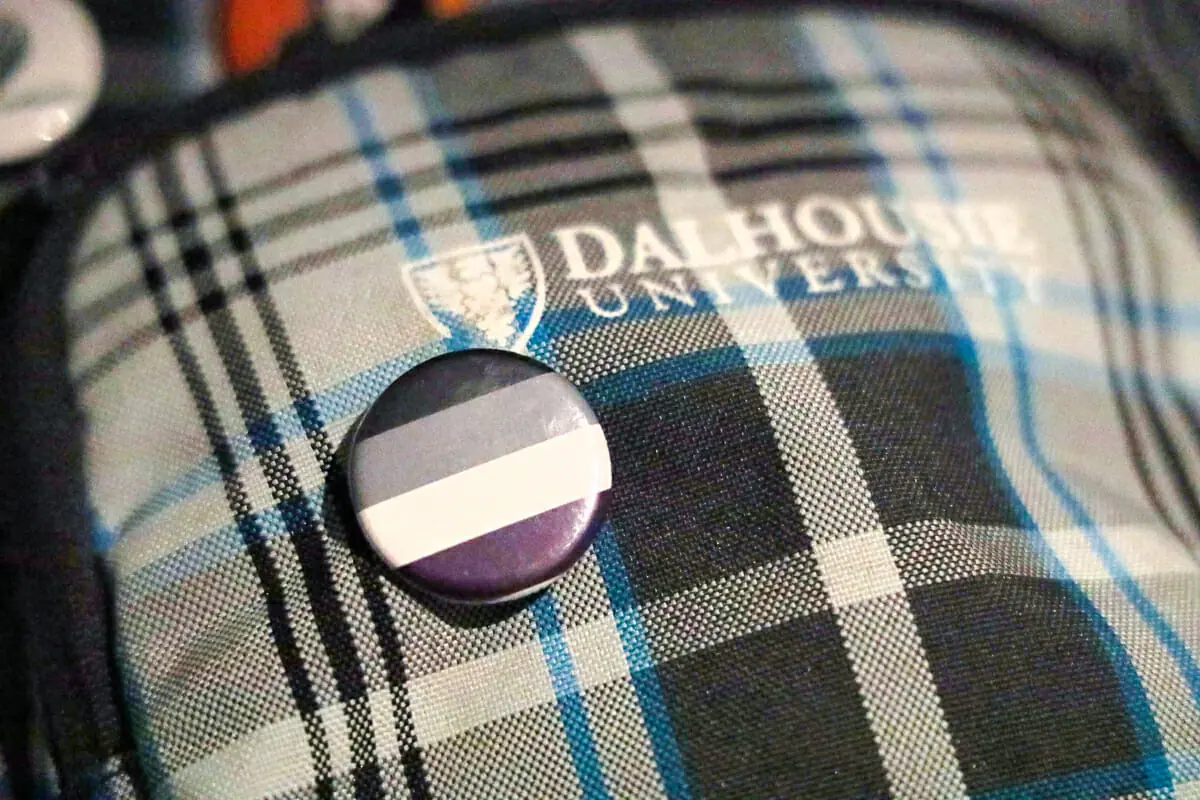Sexuality and romantic identity don’t necessarily go hand-in-hand.
Katherine Hosker, a 28-year-old Haligonian, identifies as pan-romantic asexual and is currently in a long-term relationship with a bisexual man. She learned about asexuality five years ago when she read about it online.
“I spent a horrible three days learning what asexuality was for other people and realized –– this is me.”
Asexuality is a sexual orientation characterized by a lack of sexual attraction toward anyone. According to BBC, Canadian researcher Anthony Bogaert argues around one
AVEN (Asexual Visibility and Education Network) is the world’s largest asexual online community and resource center, based in the United Kingdom. Representative Michael J. Doré said the organization was founded at a time when there was very little awareness about asexuality. Their main priority is visibility.
Doré, who is also asexual, said many asexual people feel alone, “like they are
However, this shouldn’t be confused with not having sex; many asexual people do engage in sexual activity regardless. Doré said “many non-asexual people have sex with people they’re not attracted to” and it’s no different with asexuality.
For example, Hosker said she enjoys sex but lacks attraction and libido. “It’s like when you’re hungry, but you don’t know what you’re hungry for,” she said.
“You go to the fridge and nothing is appealing, then you go to the cupboard and nothing there is appealing, but you’re hungry and want to eat something and you don’t really have a preference for what you want,” she said, “that’s what it is like for me to experience sexuality.”
Doré, on the other hand, said that he wouldn’t have sex under any circumstances and has never experienced sexual attraction. At AVEN, it’s important to recognize that everyone experiences asexuality differently, he said.
Spectrum of experiences
Iz Lloyd, another Halifax resident, identifies as demisexual.
“I don’t develop any sexual desire until I have a fairly deep connection with someone,” she said, “sometimes I can date someone for three years and that still doesn’t happen.”
Lloyd considers herself a romantic person and doesn’t have a preference whether she dates someone asexual or otherwise, as long as they’re respectful.
“I’m in a relationship now and I absolutely adore my partner. They were great about waiting until that happens and knowing that it might not,” she said. “I’ve dated people in the past that have gotten very upset and shamed me heavily for how I feel.”
Demisexuality is on the spectrum of asexuality and falls into a “grey area” where people don’t experience sexual attraction until they have an emotional connection. This most commonly happens within a relationship, but it doesn’t have to.
“I think the most confusing part was when I was 18 and I didn’t know I was demi,” she said, “I would snuggle with people and think ‘Oh this is great’ and then I would sleep with them and not enjoy it at all.” After finding out about demi-sexuality, she was relieved that she was not alone. “Oh, I’m not weird. My brain isn’t miswired somehow,” she said.
Before the internet, being openly asexual was almost impossible. AVEN pushes to recognize asexuality as a legitimate orientation.
“We feel that it is very important to get accurate information about asexuality out there,” Doré said.
Part of the community
“We consider ourselves to be a part of the LGBT+ community,” said Doré.
However, there are still negative attitudes and misconceptions about asexuality.
“We get comments that we are trying to impose our prudish views or stop people from having sex. The same as any sexual orientation should be celebrated, same goes with lack of sexual attraction,” he said, “it’s not any less valid.”
Local sexual and gender resource center South House recognizes asexuality as a part of the queer spectrum. Frank Heimpel, the Outreach
Heimpel said that South House thinks of “queer” as not just “gay,” but everything that falls into that spectrum. “I think it is important to contextualize oppression under the relatives of heteronormativity and cisnormativity. Asexual people are one of many who fall out of that cis/heteronormativity and what is expected there.”
Hosker said she’s never personally experienced any discrimination for being asexual but does see it online.
She said the most annoying comment is “How do you know you don’t want sex if you’ve never had it?” to which she responds: “How do you know you don’t want to deep-throat a pineapple if you’ve never done it?”
In Lloyd’s experience, demi-sexuality is often disregarded within the local LGBTQ+ community, the ace community especially.
“Ace people don’t think we’re actually ace. With the rest of the community, it is mostly just ‘Oh so you’re a prude. You won’t sleep with anyone until you’re in a relationship.’”
Sexuality, Lloyd said, is easily explained through analogies.
“
There’s some people that really like cupcakes, they’ll eat any kind of cupcake and thenthere’s other people who only like one specificflavour of cupcake andthere’s other people who don’t like them at all,” she said, “andthere’s people like me, that like just one cupcake and they really like that one cupcake and have no interest in any others.”
AVEN also understands that sexual orientation and romantic orientation don’t always go together. A person can be homoromantic and heterosexual, or aromantic and pansexual, or aromantic and asexual and so on, said Doré.
“What we emphasize about asexuality is that it is not a choice. It’s just like being gay or straight or bisexual; it’s not a decision to not have sex, it’s not like celibacy and it’s not abstinence.”


Recent Comments